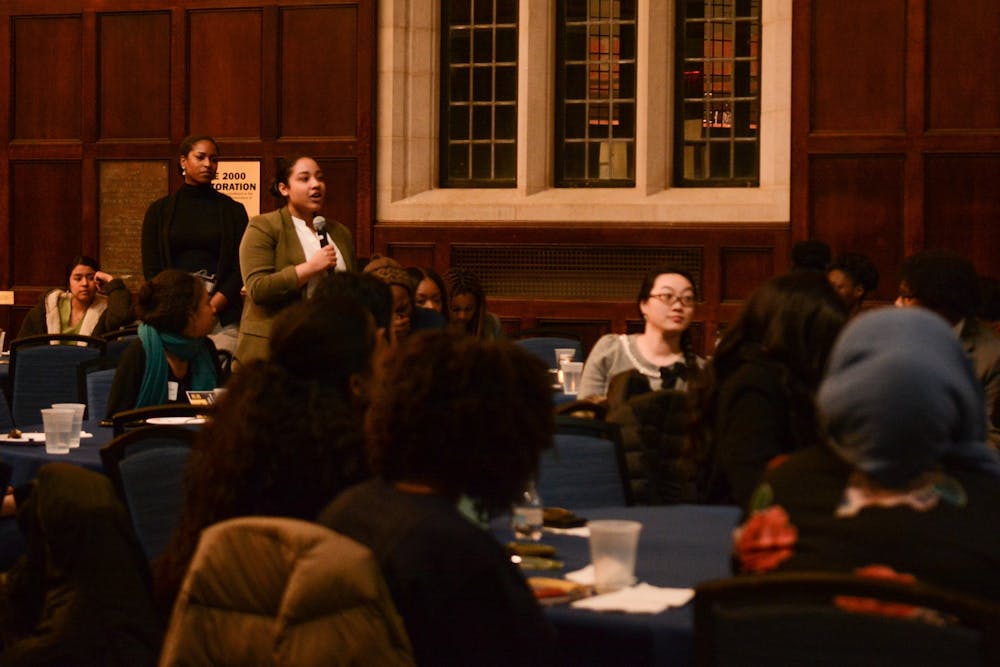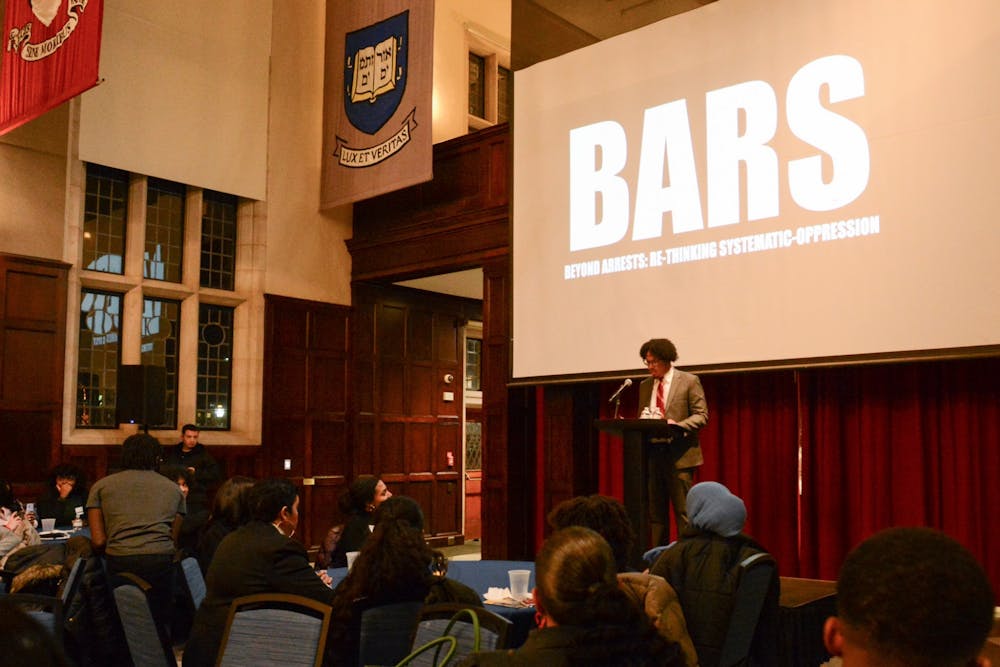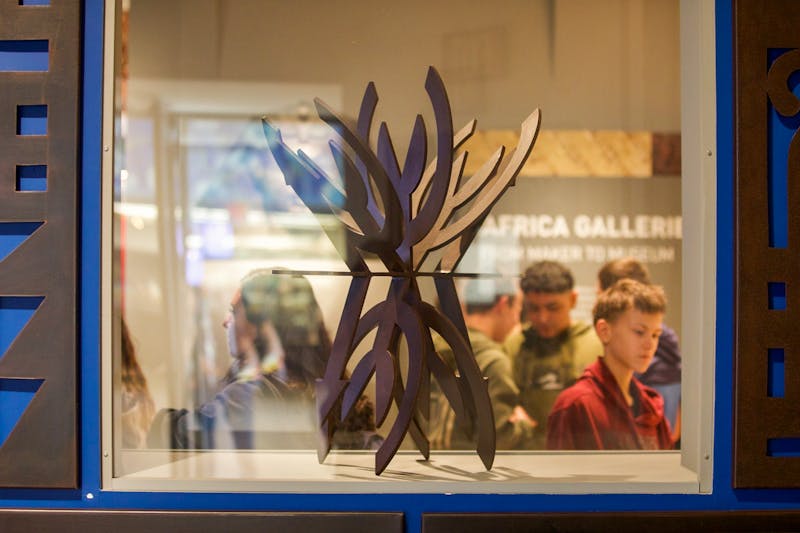
Cyntoia Brown-Long was sentenced to life in prison at just 16 years old after killing a man who solicited her for sex. Exonerated after serving 15 years, Brown-Long visited campus to speak at a conference organized by Penn’s student-led criminal justice reform group, Beyond Arrests: Rethinking Systematic Oppression.
Titled "Breaking Chains, Building Coalitions: Diversifying the Face of Criminal Justice Reform," the BARS conference featured numerous speakers and events to advocate for criminal justice reform, with a focus on highlighting marginalized voices, especially those who have been incarcerated. Along with Brown-Long's keynote speech, the event included a panel of formerly incarcerated activists, a panel of scholars whose research focuses on criminal justice reform, and a volunteer fair featuring different activist organizations.
The conference culminated with Brown-Long's speech, during which she told the audience about her sex trafficking and incarceration experiences. Brown-Long emphasized the way the public education and criminal justice systems failed her throughout her troubled childhood and adolescence.
She said being adopted made her feel like an outcast from a young age, and she soon became known as “the bad kid” at school. Brown said that any small offense, be it an eye roll or smart remark, landed her in the principal's office. She was suspended numerous times before being expelled and sent to an alternative school.
After bringing a bottle of caffeine pills to school, she was sent to juvenile detention for the first time. Upon returning to public school after juvenile detention, she said she felt more like an outcast than ever.

Beyond Arrests: Rethinking Systematic Oppression (BARS) is Penn's student-led criminal justice reform group that, on Feb. 22, held its first-ever conference titled Breaking Chains, Building Coalitions: Diversifying the Face of Criminal Justice Reform.
"Something happened to me from experiencing life inside of the system at such a young age," Brown-Long said. "It was like I was the woman with the scarlet letter, only I had the word 'monster' tattooed on my forehead. It was glaringly obvious that I wasn’t wanted, and it was no secret that I was on probation to teachers and students alike."
Brown-Long was in and out of Tennessee juvenile detention centers before running away from home around the age of 13. She soon met and began dating the pimp who raped and assaulted her on numerous occasions, and forced her into prostitution.
In 2004 at age 16, she shot 43-year-old Johnny Allen who purchased her for sex, after he became violent with her. Brown-Long was arrested the next day on counts of first-degree murder despite her claims of self-defense.
Brown-Long said she was not read her Miranda rights, and police officers coerced her into speaking with promises of leniency before she was appointed an attorney. Tried as an adult and referred to as a "teen prostitute" in court, Brown-Long was sentenced to life in prison. She petitioned for clemency in 2017, and was ultimately released from jail in August 2019 after serving 15 years behind bars.
Brown-Long’s appeal for clemency sparked a national conversation on sex trafficking and criminal justice reform. Celebrities like Kim Kardashian, Rihanna, and Snoop Dogg took to social media to support Brown-Long and condemn the flaws of the criminal justice system.
According to College senior and BARS member Naeche Vincent, the group sought to bring stories like Brown-Long's to Penn's campus to encourage discourse about criminal justice reform among students.
“There’s such a large population [at Penn] that’s privileged and may not ever go through something like this," she said. Vincent said that wealthier criminals are privileged in the United States' criminal justice system, referencing the nationwide college admissions scandals.
"It's a very important conversation to have here, to recognize our privilege and really understand what’s going on in the communities around us," Vincent said.

BARS sought to bring stories like Brown-Long's to Penn to encourage discourse about criminal justice reform.
The conference also featured Terrance Lewis, a Philadelphia native who was wrongfully accused of murder and was sentenced to life without parole. He was released after 21 years and is now an advocate for criminal justice reform.
Lewis said his lawyers told him it did not matter whether he was innocent, or how many material witnesses he had.
“You are guilty, because your number’s just been called, until you prove you’re innocent,” he said, adding that the criminal justice system is designed against people of color.
Lewis, who was sentenced to life behind bars as a teenager, added that “juvenile lifer," a term referring to minors sentenced to life in prison without parole, is a term no other country has coined.
College first-year and member of BARS Emilia Onuonga, who is also a Daily Pennsylvanian opinion columnist, said the group chose speakers they hoped would resonate with attendees.
“I hope to get people fired up about criminal justice reform, and I think it’s very effective to hear from people who have been formerly incarcerated because I think that it’s a different perspective and it’s more in tune with what’s going on [in prisons],” she said.
Onuonga referenced Lewis' speech, where he emphasized the importance of personal narratives in criminal justice reform efforts.
"To impact your heart, someone has to speak from the heart," she said.
The Daily Pennsylvanian is an independent, student-run newspaper. Please consider making a donation to support the coverage that shapes the University. Your generosity ensures a future of strong journalism at Penn.
Donate






